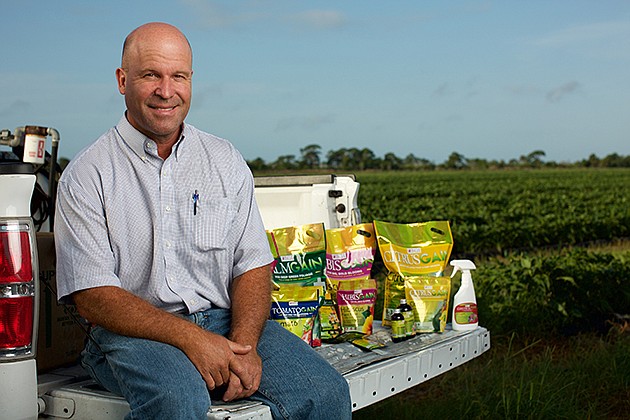- November 24, 2024
-
-
Loading

Loading

Bougainvillea plants are notoriously difficult to grow because of their sensitivity to water and weak root system.
So when commercial nurseries saw the beauty of Tom Scannell's bougainvillea, they started buying what he was feeding his plants. “We just used it in-house for our own products,” Scannell says.
Scannell's plant-food sales have been so successful that Scannell got out of the bougainvillea-growing business in 2012. Today, Bougainvillea Growers International sells plant food such as BouGain and supplements such as SuperGain through retailers such as Home Depot and to horticulturalists at Busch Gardens and Disney World.
Scannell declines to cite the company's revenues, but he says his 67-acre bougainvillea farm posted gross revenues of $7 million a year, employed 94 people and had 17 delivery trucks before he sold it.
Fact is, farming is risky business. “It only takes one bad season and you're out,” Scannell says. By contrast, the plant-food business is more secure.
Scannell developed the plant food himself, using his background as a commercial farmer and his degree in soil science from the University of Wisconsin at Madison. “I've tried hundreds of fertilizers,” he says.
He gleaned the latest research from cutting-edge agriculture scientists at Cornell University, University of California-Davis and Michigan State University. “It's like open-source code for ag,” he smiles.
Scannell, who lives in St. James City, an agriculture hamlet on Pine Island in Lee County, says his company's sales have doubled since 2012. He's particularly excited about selling through Amazon.com, where he's posted sales growth 262% year over year to March. “Our sales went through the roof,” he says.
Gain fertilizers are attractively packaged in shiny bags that light up a usually dreary and smelly area of most garden centers. Scannell is fond of quoting a Home Depot buyer who once told him: “You've got to be showroom ready every day.”
Scannell gained a foothold in Home Depot because he used to sell the company bougainvillea plants. “When we switched from live goods to hard goods, the relationship remained,” he says.
Better known by its initials BGI, the company's 4,000-square-foot warehouse in Cape Coral is stacked to the ceiling. Scannell says he needs double the space to expand. He's considering a subscription service for fertilizer and supplements that can be sold with plants, among other ideas.
But Scannell, 53, a busy father with seven daughters, wants to grow his company carefully and gradually. “I don't want to compete with Scotts because I'll lose,” he says. The Scotts Miracle-Gro Co. is the publicly traded goliath of the industry with $2.8 billion in annual sales. “My goal is to grow 20% a year,” Scannell says.
Scannell has been there, done that. From 1986 to 2001, he borrowed to grow cotton, rice, soybeans, wheat and corn on 3,000 acres in Northeast Louisiana and Southeast Arkansas. But Scannell candidly confides why he's not keen on debt or outside investors: “I don't want to be told what to do,” he smiles.
Follow Jean Gruss on Twitter @JeanGruss